How To Get Rid Of Diarrhea In Puppies?
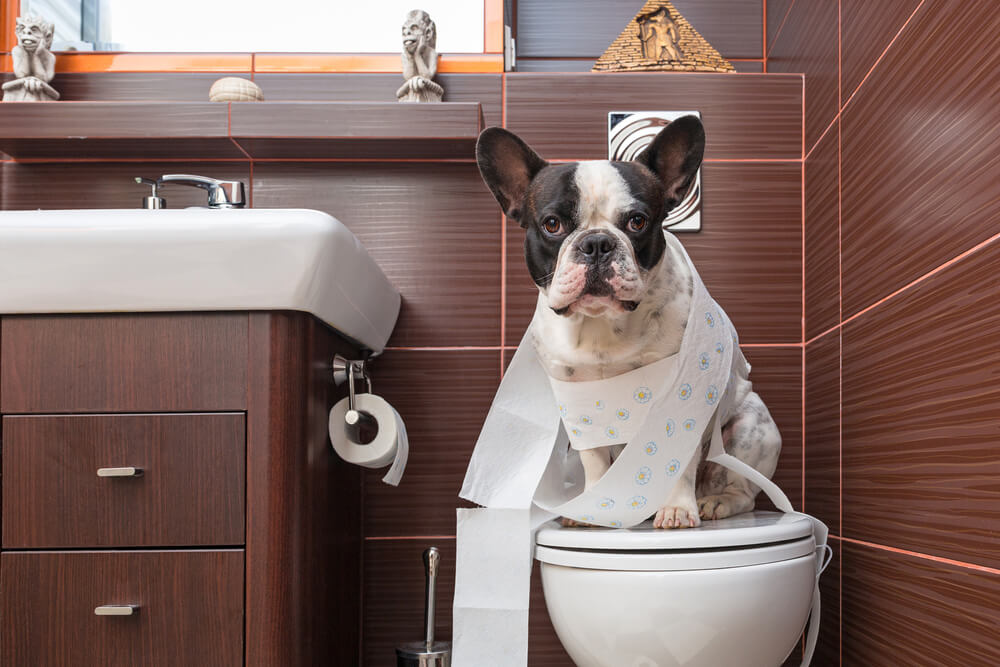
Table of Contents
Listen To The Article
Introduction to How to Get Rid of Diarrhea in Puppies?
When diarrhea strikes puppies, it can be a scary, stressful and ugly situation.
Fortunately, there are some simple steps you can take to stop diarrhea in puppies.
The first step is to keep your puppy comfortable since diarrhea is often caused by intestinal infections, don’t be shocked if your puppy is lethargic or feels warm.
However, if your puppy is in pain, he may be restless, anxious, and upset, so be sure to keep him still and calm when you can.
Diarrhea in puppies is a common problem that can be caused by several factors, including but not limited to: diet change, new food, infection, and stress.
To treat your puppy, you will need to first identify the underlying cause of diarrhea.
Diet changes can be easily remedied by slowly reintroducing your puppy to its previous diet after diarrhea has been gone for at least two days.
If your puppy has ever had diarrhea, you know how much of a mess it can be.
This is especially true if the diarrhea is accompanied by vomiting as well. Worse yet, diarrhea can be dangerous in puppies that aren’t old enough to hold down food.
Few things will bring an animal into the vet quite as quickly as a bout of diarrhea.
For most small animal veterinarians, it is something we see daily.
Sometimes, dog diarrhea cases are easy with quick fixes this is not always the case.
Chronic or extensive dog diarrhea cases can be frustrating for both the pet parent and the doctor because they are expensive and difficult to understand.
Fortunately, several natural solutions can help stop your puppy’s diarrhea, as well as keep it from coming back.
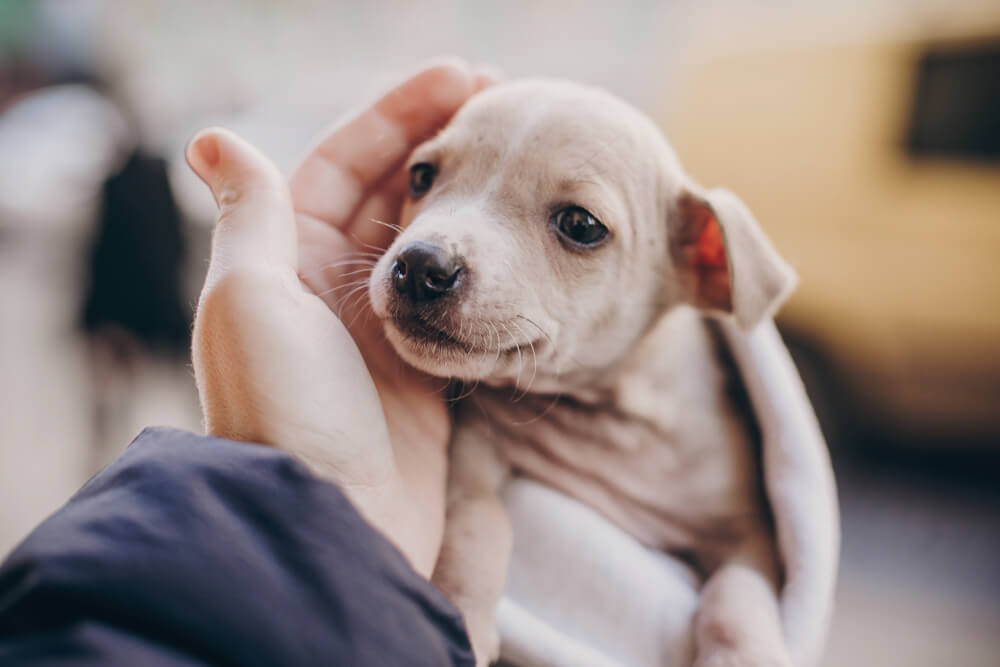
What Causes Diarrhea In Puppies?
Diarrhea is one of those frustrating symptoms for owners because it can mean that your puppy has anything from a potentially lethal virus to simple indigestion.
Any pet owner who has googled “puppy diarrhea” is well aware that many serious and minor puppy ailments list diarrhea as a symptom, making it hard for owners to determine what is serious and what is not.
Don’t panic.
Despite the endless lists of horrifying diseases out there, there are six main causes of diarrhea in puppies that you need to know about:
Diet
There are many reasons why you might switch up your dog’s diet.
Maybe your vet recommended a higher-quality brand of food or your local store ran out of your puppy’s usual kibble.
Regardless of the reason, even a simple change in diet can cause diarrhea in puppies.
Your current food could also be the problem.
Sometimes puppies develop intolerance or sensitivity to certain foods or ingredients.
If you suspect that your puppy has a food intolerance or sensitivity, talk to your vet about the best way to manage her diet and resolve her diarrhea.
Bacterial Infection
Puppies have more delicate immune systems than adult dogs, which makes them more susceptible to bacterial infections. Salmonella, E. coli, Clostridium, and other bacteria can cause puppy diarrhea.
These diseases are serious and are usually accompanied by other symptoms, like bloody diarrhea, loss of appetite, fever, and vomiting.
Viral Infection
Perhaps the most worrying cause of puppy diarrhea is a viral infection.
The parvovirus and distemper virus are both potentially fatal diseases that affect unvaccinated or partially vaccinated puppies.
The coronavirus is also a cause of viral diarrhea in puppies. All viruses require medical attention from your veterinarian.
Ingestion
Puppies eat things that they are not supposed to.
From garbage to poisonous plants, if your puppy can reach it, chances are he’ll try and eat it.
Consuming garbage, especially garbage full of food, often leads to puppy diarrhea, and in some cases can cause blockages that require veterinary intervention to resolve.
Poisons and toxins also cause diarrhea.
Visit your nearest veterinary emergency center immediately if you suspect your puppy ate something potentially harmful.
Parasites
Young puppies are prone to parasites.
Whether they are born with parasites or pick them up from the environment, parasites like roundworms, hookworms, whipworms, coccidia, and giardia all cause diarrhea in puppies, and all require veterinary attention.
Stress
Sometimes the reason behind puppy diarrhea is simple. Stress can cause diarrhea in dogs just like it does in humans, and puppyhood is certainly a stressful time.
Your puppy is constantly meeting new people and exploring new things, and adjusting to the routine of your household is sometimes enough to trigger stress-related diarrhea by itself.
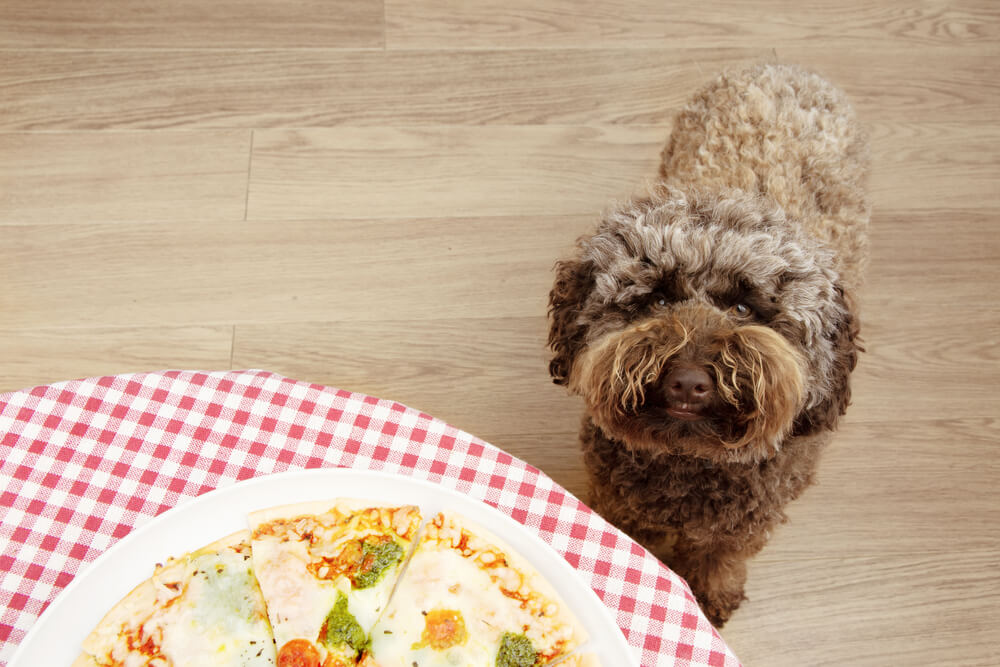
What Kind Of Human Foods Can Cause Diarrhea?
Fed our dogs a little bit off our plate or topped the bowl of kibble with a little something yummy.
I know the temptation is real, and that sweet face asking for more is tempting, but just say no!
Our pets’ digestive systems are very different from our own.
In general, dogs and cats are not well equipped to digest large volumes of fat or even any amounts that are more than whatever their normal is.
Treats that are high in salt and sugar can lead to diarrhea by simple osmosis pulling water into the gastrointestinal tract as it is digested.
If you are going to feed your pet “human food,” stick with safe fruits and vegetables such as carrots, green beans, or apples (without seeds).

Types Of Dog Diarrhea
When attempting to narrow down our list of causes, we break dog diarrhea down into two major categories:
Large-Bowel Diarrhea
Large-bowel diarrhea, or diarrhea arising from the large intestine or colon, is characterized by:
- Increased frequency
- Small volumes of stool
- Straining to defecate
Red blood in the stool as well as mucous.
Pet parents are often very concerned when they see blood in their dog’s stool.
While this is certainly a sign of inflammation and a good time to come to the vet, a small amount of blood is often par for the course when dealing with large-bowel diarrhea.
Storage of stool until it’s ready to exit.
Resorption of water to prevent dehydration.
Since the colon needs to pull water out of the poop, blood vessels are very close to the surface and easily break with straining and inflammation.
Likewise, there are mucous glands in the colon to help lubricate stools for easy passage.
When there is inflammation, they will overproduce their mucous coating.
When the colon isn’t working right, stools can also be very watery.
If there is a large volume of blood noted in the stools, this is more concerning and should be addressed with more urgency.
Small-Bowel Diarrhea
Small-bowel diarrhea or diarrhea arising from the small intestine is characterized by:
- Large, goopy poops produced at normal frequency
- The stool is often fatty and frothy
- Stool rarely has red blood or mucous
There is typically no straining involved
The job of the small intestine is the absorption of nutrients.
When there is inflammation or dysfunction, there can be a lack of absorption, resulting in fatty stools.
We can also see signs of malnutrition in dogs with small-bowel diarrhea: Weight loss, poor hair coat, and Ravenous appetite
Acute Diarrhea in Dogs
Some episodes of dog diarrhea can be easily cleared up.
Acute onset of diarrhea can often resolve on its own with minimal intervention from you.
When your dog’s diarrhea has lasted for 48 hours or more, or you see blood in the stool, or your pet has additional symptoms (vomiting or inappetence), it is time to visit the vet.
Chronic Diarrhea in Dogs
Chronic diarrhea is persistent despite initial treatment or is recurrent.
Causes include: Parasites such as whipworms, Inflammatory bowel disease, Exocrine pancreatic insufficiency, Hyperthyroidism or other metabolic condition, Cancer and Dysbiosis
Chronic diarrhea in dogs can sometimes lead to weight loss, a dry and unthrifty hair coat, and lethargy.
If your pet is continuously exposed to a diet that they are sensitive to, this can also cause chronic intermittent diarrhea.
Some dog foods that are marketed as healthier for your pet can also be high in fat and protein.
Grain-free diets remove healthy fiber content from the dog food, which can be very rough on a sensitive system.
It is important to look for balance in a diet and that it comes from a reputable company that is doing their homework when it comes to their formulations.
Diarrhea With Vomiting in Dogs
When dog diarrhea occurs with vomiting, a new section of the gastrointestinal tract has entered the picture.
Gastroenteritis is the group term for inflammation of both the stomach and the upper GI tract.
Sometimes a high-fat treat, even a small one, can trigger pancreatitis a condition wherein the pancreas, which produces digestive enzymes, among other things, becomes inflamed.
This condition can cause acute vomiting and diarrhea as well as abdominal pain. In very severe cases, pancreatitis can even be fatal.
Vomit that contains blood can look red, brown, or black.
Unlike a small amount of blood in the stool, any amount of blood in vomit is concerning and should result in a trip to the vet right away.
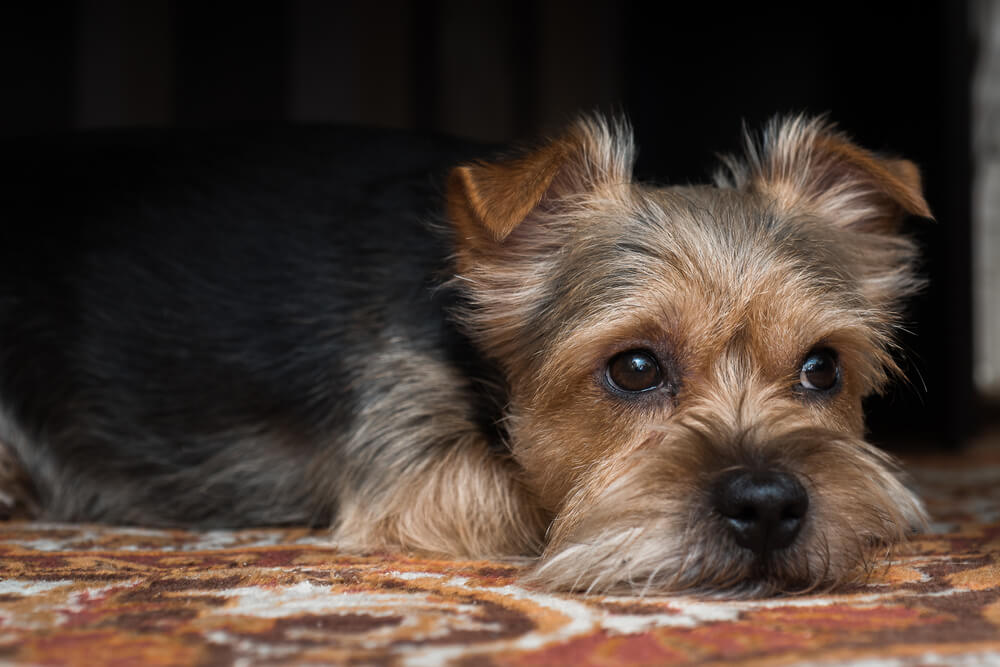
Preventing Diarrhea In Puppies
Reducing stress and introducing new food slowly are great ways to prevent puppy diarrhea, but they are not the only tools in your tool kit.
Make sure you’re supervising your puppy at all times.
Keeping a watchful eye on your new pup will help keep them from ingesting dangerous items and generally staying out of trouble.
Because there are a variety of causes of diarrhea in puppies, it is important to check with your veterinarian whenever you see that they have diarrhea.
Partnering with your veterinarian to get a proactive health plan in place will keep your pup straight and narrow.
Within a few days of bringing your puppy home, take them to your veterinarian for a complete physical examination.
Your veterinarian will assess the puppy’s overall health and condition, check for the presence of parasites and answer any questions that you may have about feeding and healthcare.

What Does The Color Of Your Dog’s
Diarrhea Mean?
The color of your pet’s bowel movement is most often impacted by what they are eating.
Simply put, lighter-colored foods will result in lighter-colored poop.
There are a few color indicators that are important to note when talking to your vet.
Yellow Diarrhea
Yellow diarrhea is most typically caused when a pet parent has started feeding a bland diet, such as chicken and rice.
The chicken and rice are white, and when they mix with yellow bile in the gastrointestinal tract, it comes out as yellow stools.
Bloody Diarrhea
Bloody diarrhea or hematochezia is caused when there is large bowel diarrhea or colitis.
This occurs when small blood vessels in the lower part of the GI tract break open and bleed a bit into the stool.
A small amount of blood is not overly concerning, but if the stool is primarily blood, your pet should be taken to the vet right away.
Black Diarrhea
Black diarrhea or melena is caused when blood is being digested before it is passed.
This stool looks like newborn baby poop and can have a black or greenish color.
Melena can be seen with conditions such as bleeding ulcers or foreign bodies.
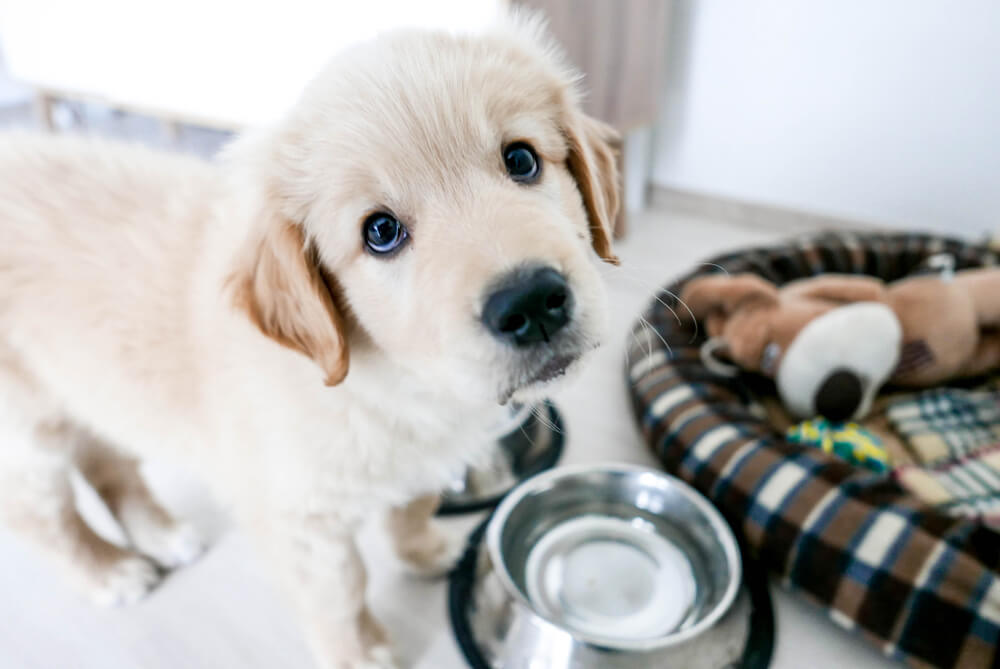
What To Give Dogs For Diarrhea At Home
You should never use your human medications on your pets.
Only administer medications as prescribed by your veterinarian.
Antibiotics can make diarrhea worse.
Imodium works by paralyzing the gastrointestinal tract.
This can be a problem for pets that eat things they aren’t supposed to (such as toxins or foreign objects or have parasites that need to be moved through.
Once diarrhea has resolved, introduce food slowly to help prevent further tummy upset.
You may have heard that white rice and boiled chicken help with sensitive stomachs but soup or broth is a gentler way to smooth your dog’s transition back to his regular diet.
You can purchase soup or bone broth at your natural supermarket, but make sure it’s low in sodium and has limited ingredients (with no onion).
The best thing you can do for your dog at home when diarrhea hits is to feed them a bland diet.
Here is a simple recipe you can make at home:
- Place three to four chicken thighs in six cups of water.
- Add chopped celery and carrot if you like.
- Bring to a boil and simmer for 1½ to 2 hours.
- Remove the skin and bones and set the meat aside.
- Strain the broth and let it cool before serving.
- Give your dog small portions of the soup a few teaspoons for very small dogs, and ½ to one cup for larger dogs. Wait 4 to 6 hours and watch for diarrhea or vomiting before offering more.
Don’t feed the soup if there’s still diarrhea present wait until diarrhea resolves.
Don’t worry, adult dogs can easily go days without eating, as long as they can keep water down.
Think simple protein (lean chicken, beef, ground chuck, white fish, or cooked eggs and simple carbohydrates (white or brown rice, white or sweet potatoes combined.
Feed small, frequent meals that help heal but do not overwhelm it.
In the case of stress-induced diarrhea, starting a fiber supplement a few days before the stressful event can help prevent diarrhea from starting.
Psyllium fiber can be purchased over the counter in products like Metamucil.
You can also opt for canned pumpkin as a source of fiber that you can add to your dog’s food.

When To Call The Vet
With so many causes of puppy diarrhea out there, how do you know when to call the vet and when to wait it out?
Call your vet and explain your puppy’s symptoms, and let your vet decide if he or she thinks that your puppy needs to come in for a visit.
Most cases of puppy diarrhea are not severe.
However, if your puppy has any of the following symptoms: Bloody diarrhea, Black, tarry stools, Fever, Pale gums, Discomfort or pain, and Vomiting
If your dog is healthy and has a strong immune system, these natural solutions should resolve diarrhea in 2 or 3 days. If your dog still has diarrhea and seems sick work with your holistic vet to find out why. Your vet may:
- Change your dog’s diet.
- Run a fecal exam to rule out parasites.
- Check blood work to rule out concerns with organ functions.
- Do X-rays or an abdominal ultrasound to rule out foreign objects, obstruction, and cancer.
- Do an endoscopy to view the stomach and intestinal mucosa
Luckily, most cases of diarrhea are self-limiting. With a little help from you, your dog can get back to normal quickly.



